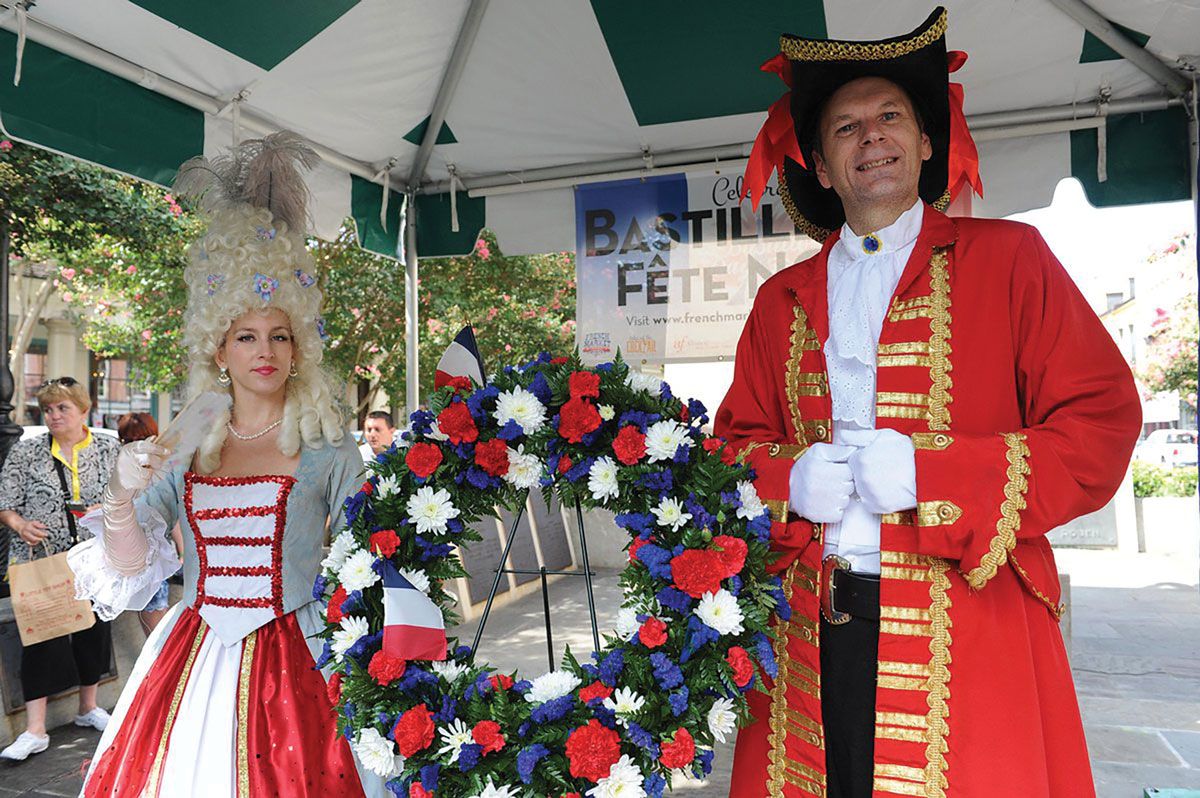New Orleans has always had a unique mix of cultural and ethnic backgrounds that have helped shape the city's present identity. However, there might not have been a New Orleans—or even a Louisiana, for that matter—if it weren't for France in 1718. Although the Big Easy is not officially part of the Francophone community (that's more the Acadiana region of Louisiana), no one can deny the lasting impact the French left on New Orleans (and all the good and bad times the city saw while under their rule). So, like other distinctly French regions of the world, one way that New Orleans recognizes its heritage is through celebrating Bastille Day.
Celebrated on July 14, Bastille Day (also called le 14 juillet or la Fête Nationale) is France's national day of celebration, on the same level of importance as Independence Day for the United States. The day, which commemorates the Storming of the Bastille, is important to the French people because it celebrates the turning point in France's becoming a modern democratic country after hundreds of years of monarchy rule. French history, especially the French Revolution, is very long and complex. But with limited space to work with, here are some high points, as clear and concise as possible.

In the late 1700s, after losing to Great Britain and Prussia during the Seven Years' War, as well as supporting the 13 Colonies during the American Revolutionary War, France was in severe financial trouble. To try and combat this, the government of King Louis XVI imposed taxes on the French commoners (the Third Estate), while the clergy and nobility (the First and Second Estates) were exempt and were also given other special privileges. With taxations, years of bad harvests, and numerous times when the clergy and nobility would outvote them during general assemblies, the commoners were growing increasingly angry and spiteful.
During the first year of the French Revolution in 1789, the all-important Storming of the Bastille occurred on July 14. Three days earlier, France's Finance Minister Jacques Necker, who was considerate towards the Third Estate, was dismissed from government. Fearful that they would be attacked by those loyal to the king, the people of Paris stormed the Bastille Saint-Antoine (which also severed as a fortress, armory, and political prison) for gunpowder and ammunition. With the help of rebel French guards and the Bastille's commander Governor de Launay, who opened the gates to avoid a massacre, the crowd got into the fortress and ended up killing de Launay, along with some of his guards, and putting his head on a spike. Right after that, the French government abolished the feudalist system of the estates.
The Storming of the Bastille served as a prime example of common French citizens rising up in defiance against the royal authority that had been taking advantage of them. While France had to go through even more challenges during and after the French Revolution (Louis XVI's execution, Robespierre and his Reign of Terror, and Napoleon Bonaparte's empires), all of these events eventually led the country to become the democratic republic that exists today, This is why the Storming of the Bastille, in particular, is still celebrated today. There was actually a precursor to Bastille Day in 1790, called la Fête de la Fédération on the Champ de Mars, which celebrated the beginnings of the revolution.
Thanks to the spread of culture throughout the French colonial empire, Bastille Day is celebrated all over the world in French-speaking countries and areas (France, Belgium, Canada, French Polynesia), places that used to have French colonists or settlers (Pondicherry, India; Franschhoek, South Africa; New Orleans), and also some major cities throughout Europe (Prague, Budapest, Dublin, even London). In a top-10 list of travel destinations to celebrate Bastille Day published by Hotwire.com, New Orleans ranks third, behind Paris and London.
Even though Louisiana was under Spanish control during the Storming of the Bastille (it was eventually given back to France during Napoleon's rule), New Orleans's deep French heritage has made it a prime spot for Bastille Day celebrations. Unfortunately, due to COVID-19, there won't be any official celebrations of the holiday in the city this year. However, there have been Bastille Day celebrations in New Orleans since 2012, with Bastille Day Fête, organized by the Alliance Française of New Orleans, the Consulate General of France in Louisiana, the French-American Chamber of Commerce - Gulf Coast Chapter, and the New Orleans Tourism Marketing Corporation. Hosted at the New Orleans Museum of Art, Bastille Day Fête presents a more general celebration of the city's colonial heritage, with presentations of French-themed food, music, art, activities, and more. There's also the Faubourg St. John Bastille Day Block Party, which has been partying on the 3100 block of Ponce de Leon Street since 2006.
Although the French language is not really prevalent in New Orleans anymore since the Civil War (English-language education was heavily pushed, and children who spoke French on school grounds were often subjected to corporal punishment), the city's French heritage is right in the name. For better or for worse, France gave birth to New Orleans, Louisiana. What better way to recognize the country that put this city on the map than doing what New Orleanians do best? Celebrate New Orleans-style (at home this year) and have a happy Bastille Day. Vive la France et la Nouvelle-Orléans!

